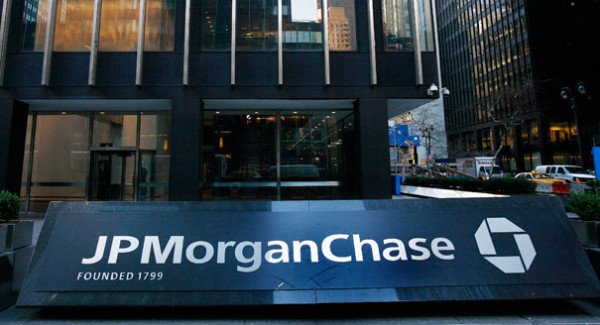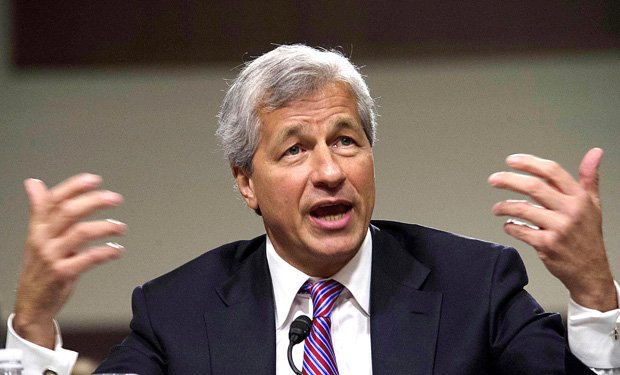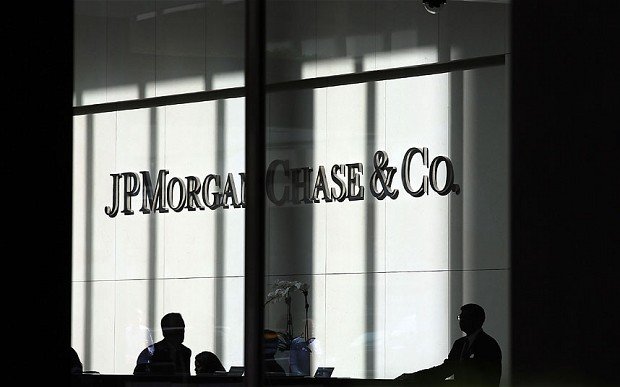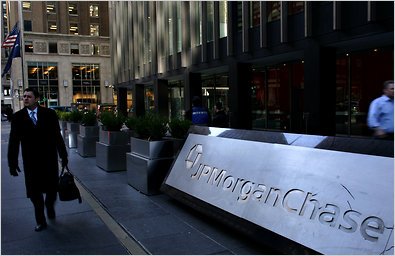Home Tags Posts tagged with "jamie dimon"
jamie dimon
President Donald Trump has promised to relax “horrendous” US banking regulations that were introduced after the financial crisis.
Referring to the Wall Street and consumer protection rules Barack Obama enacted in 2010, Donald Trump said: “We’re going to do a very major haircut on Dodd-Frank.”
Dodd-Frank aimed to prevent banks taking on too much risk and to separate their investment and commercial arms.
However, President Trump said he wants “some very strong” change to help the bank sector.
“We want strong restrictions, we want strong regulation. But not regulation that makes it impossible for the banks to loan to people that are going to create jobs,” he told a group of about 50 business leaders at a White House meeting.

Photo Reuters
“We’re going to be doing things that are going to be very good for the banking industry so that the banks can loan money to people who need it.”
Donald Trump had promised during his election campaign to relax rules on big banks, and subsequently ordered a review of the industry’s regulations.
The president’s remarks have the backing of Jamie Dimon, chairman and chief executive of one of the world’s biggest banks, JP Morgan Chase.
In his annual letter to shareholders, released on April 4, Jamie Dimon said the regulatory burden “is unnecessarily complex, costly and sometimes confusing”.
Dodd-Frank was designed to resolve the too-big-to-fail problem that meant banks facing collapse had to be bailed out rather than wound down.
However, Jamie Dimon said banks had essentially solved this issue by boosting the capital they held in reserve and introducing tougher risk controls.
JPMorgan chairman and chief executive Jamie Dimon will be paid $20 million for the past year’s work.
Jamie Dimon’s pay was cut to $11.5 million in 2012 following huge trading losses. This was half the $23 million he received in 2011.
JPMorgan’s profits fell 16% last year, after costs resulting from legal issues dented the bank’s figures.
For 2013, Jamie Dimon was paid $1.5 million as a basic salary, and an additional $18.5 million in shares, the company said.
Over the past year, JPMorgan has paid around $20 billion to regulators for various violations relating to the US financial crisis.

JPMorgan chairman and chief executive Jamie Dimon will be paid $20 million for the past year’s work
Jamie Dimon’s pay was initially cut after the so called “London Whale” trading loss, in which a single JPMorgan trader wracked up losses of $6 billion.
JPMorgan has also been caught up in another high-profile banking scandal – the manipulation of a key interest rate, the London inter-bank offered rate, or Libor.
It also had to pay fines totaling $2.6 billion to settle government and private claims resulting from its handling of the accounts of the convicted fraudster Bernie Madoff. The bank was accused of not reporting its concerns about Bernard Madoff’s investment scheme.
JPMorgan’s net income fell 7.3% for the fourth quarter of 2013 to $5.3 billion, from $5.7 billion in the final quarter of 2012.
[youtube 8Pm0xY5V9ow 650]
JP Morgan Chase has agreed to pay four regulators $920 million relating to a $6.2 billion loss incurred as a result of the “London Whale” trades.
Under the settlement, $200 million will go to the US Securities and Exchange Commission (SEC) and $215 million to the UK’s Financial Conduct Authority (FCA).
As part of the deal JP Morgan admitted violating US federal securities laws.
Traders at JP Morgan’s London office built up huge losses in derivatives trades at the beginning of last year.
Two former JP Morgan traders face criminal charges in the US relating to the case.
They deny charges of lying about the size of their trades in order to hide their mounting losses.
In a statement, the SEC said there had been failings in JP Morgan’s internal controls and in senior management.
The regulator said the bank – whose chief executive Jamie Dimon once described the trading problems as a “tempest in a teacup” – had admitted the facts underlying the SEC’s charges.

JP Morgan Chase has agreed to pay four regulators $920 million relating to a $6.2 billion loss incurred as a result of the “London Whale” trades
“JP Morgan failed to keep watch over its traders as they overvalued a very complex portfolio to hide massive losses,” said George Canellos, co-director of the SEC’s division of enforcement.
The Wall Street firm, one of the biggest investment banks in the world, is paying $300 million to the US Office of the Comptroller of the Currency (OCC), and $200 million will go to both the Securities and Exchange Commission (SEC) and the US Federal Reserve.
A further $215 million will be paid to the UK’s Financial Conduct Authority as part of the global settlement.
It said JP Morgan’s conduct “demonstrated flaws permeating all levels of the firm: from portfolio level right up to senior management”.
Tracey McDermott, the FCA’s director of enforcement and financial crime, said the failings had undermined trust and confidence in the UK’s financial markets.
“This is yet another example of a firm failing to get a proper grip on the risks its business poses to the market,” she said.
“Senior management failed to respond properly to warning signals that there were problems.
“As things began to go wrong, the firm didn’t wake up quickly enough to the size and the scale of the problems. What is worse, they compounded this by failing to be open and co-operative with us as their regulator.”
The London Whale was the name given to then-JP Morgan derivatives trader Bruno Iksil, who is believed to have racked up the losses and is now co-operating with authorities in criminal cases against other traders.
The bank’s chief investment officer, Ina Drew, stepped down following the revelation of the losses in 2012.
Jamie Dimon, whose “tempest in a teacup” comment in April 2012 prompted criticism he was underplaying the affair, said in a statement on Thursday the bank “accepted responsibility and acknowledged our mistakes from the start”.
“We have learned from [our mistakes] and worked to fix them. We will continue to strive towards being considered the best bank – across all measures – not only by our shareholders and customers, but also by our regulators,” he said.
“Since these losses occurred, we have made numerous changes that have made us a stronger, smarter, better company.”
[youtube pn715XXnqzY]
JPMorgan Chase has raised its estimate of the value of its recent losses from trading in complex financial derivatives to $4.4 billion.
The US bank said the executives responsible had been dismissed without severance pay and the bank would be clawing back two years of their pay.
When it first announced the loss in May, it said it had lost at least $2 billion.
The bank also said it had found evidence that some traders may have been trying to hide their losses.
The bank said it would restate its results from the previous three months because it had made $459 million less than it thought.
It blamed the restatement on the fact that “certain individuals may have been seeking to avoid showing the full amount of the losses in the portfolio during the first quarter”.

JPMorgan Chase has raised its estimate of the value of its recent losses from trading in complex financial derivatives to $4.4 billion
Despite those losses from its chief investment office, the bank reported three-month net profit of $4.96 billion, down 8.7% from the same period last year. JPMorgan’s shares opened up 3% in New York.
Chief executive Jamie Dimon said he had closed the division of the bank responsible for the losses and moved the remainder of the trading position to its investment banking division.
The executive in charge of the closed division, Ina Drew, left the bank in May, days after the losses were announced.
Before Friday’s gains, JPMorgan had lost about 15% of its market value since the losses were first announced.
It also said that it expected another $700 million to $1.7 billion of losses from the derivatives trading.
Responding to questions from analysts following the release of results, Jamie Dimon said: “I think it’s silly for anyone in the business world to think you’re not going to make mistakes.”
“It is not possible in the real world. I just think the mistakes should be smaller, fewer and far between, this being an exception.”
Another bank with rising shares on Friday was Wells Fargo, which was also reporting results.
It posted second-quarter net profits of $4.6 billion, up 17% from the same period last year.
Its profits from mortgages were up to $2.9 billion from $1.6 billion last year.
Wells Fargo is the fourth-biggest US bank and the biggest mortgage lender.
The results came the day after it paid $175 million to settle allegations from the Justice Department that during the housing boom, it had charged higher rates and fees to African-American and Hispanic customers.
Wells Fargo said it had settled to avoid a long legal battle.
JPMorgan Chase, the biggest US bank, has revealed a surprise trading loss of $2 billion on complex investments made by its traders.
Overall, after accounting for other gains, losses at its chief investment office (CIO) are estimated to come in at $800 million in the second quarter.
The loss could be as big as $1 billion, chief executive Jamie Dimon said in an unscheduled conference call.
JPMorgan shares fell 6% after-hours, with other bank stocks following.

JPMorgan Chase has revealed a surprise trading loss of $2 billion on complex investments made by its traders
Goldman Sachs, Citigroup and Bank of America also suffered heavy losses in electronic trading after the market close.
The strategy taken at its CIO had been “riskier, more volatile and less effective” than previously believed, Jamie Dimon said.
“There were many errors, sloppiness and bad judgement. These were egregious mistakes.
“They were self-inflicted and this is not how we want to run a business.”
The CIO is an arm of the bank used to make broad bets to hedge its portfolios of individual holdings. Hedging is an investment practice used to reduce the risk of price fluctuations to the value of an asset.
The trading loss, revealed in a regulatory filing, is expected to hurt JPMorgan’s overall earnings in the quarter, and will come as an embarrassment to the bank.
It had emerged from the 2008 financial crisis in much better health than many of its rivals after avoiding risky investments that had hurt others.
“We will admit it, we will learn from it, we will fix it, and we will move on,” Jamie Dimon said.
He added that the bank was trying to unload the portfolio in question in a “responsible” manner in order to minimize the cost to shareholders.
Jamie Dimon said the type of trading that led to the loss would not be banned by the so-called Volcker rule, designed to censure certain types of trading by banks with their own money.
But he acknowledged that the errors would be particularly embarrassing, given his public criticism of the Volcker rule.
“It plays right into the hands of a bunch of pundits out there, but that’s life,” he said.
Prof. Mark Williams from Boston University, and a former Federal Reserve regulator, said taxpayers should be concerned about these trading losses.
“Taxpayers ultimately have to bail out these <<too big to fail>> banks. And that’s what JPMorgan is – it is too big to fail,” he said.
“How could a bank that’s supposed to be the premier bank in setting the leadership role allow such risk taking?”





